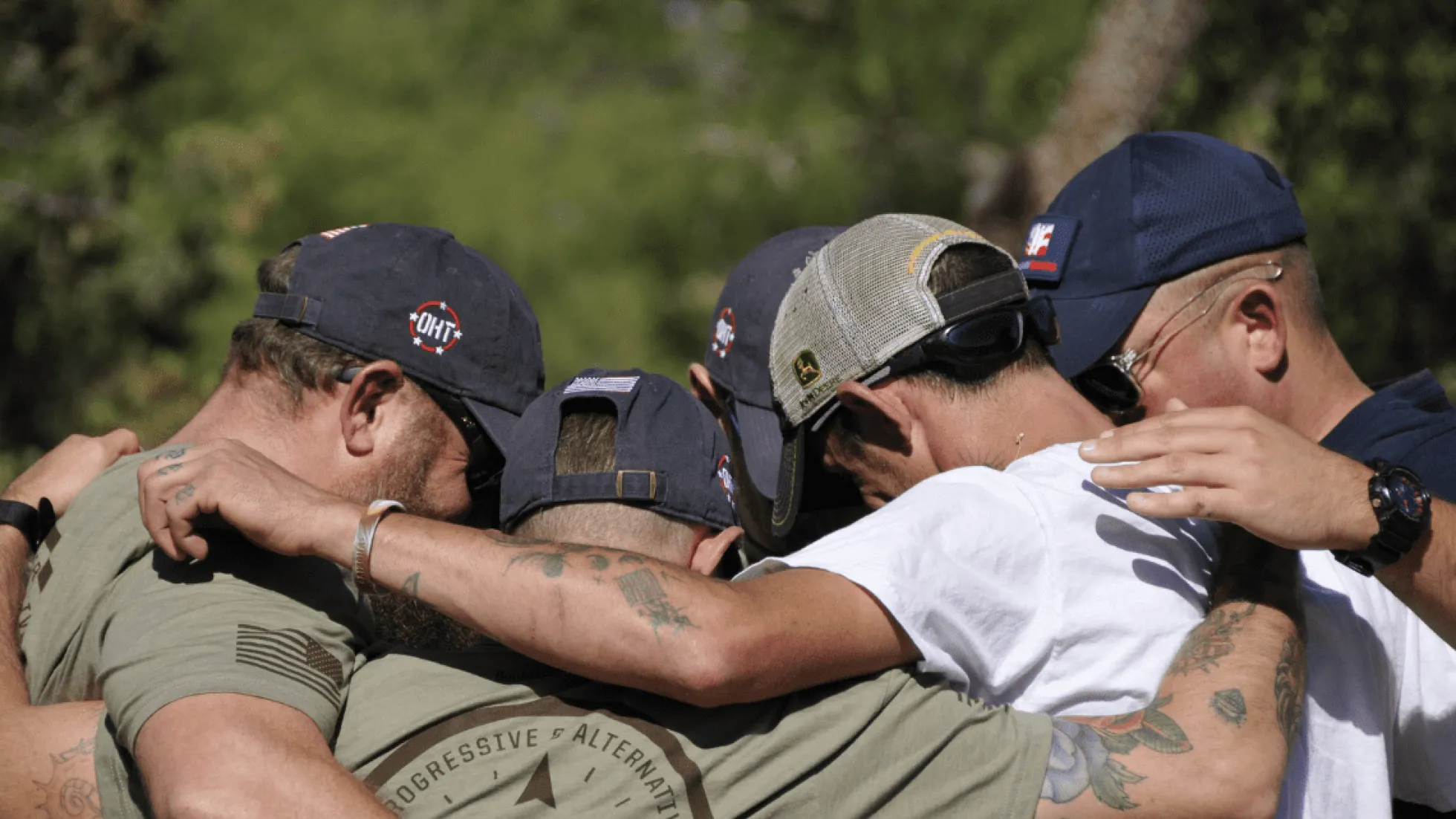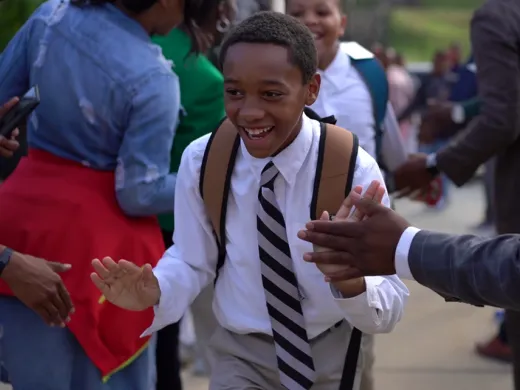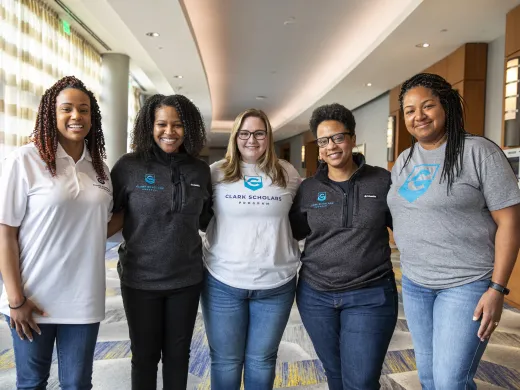Grantee Case Study
A Unique Vision to Transform Mental Health Approaches for Veterans and First Responders
with Boulder Crest Foundation
In partnering with Ken Falke, the founder of the Boulder Crest Foundation, the Clark Foundation trusted his vision and conviction that military veterans and their families needed new approaches to successfully address mental health challenges. Under the leadership of Falke and his successor, Josh Goldberg, the Clark Foundation continued to see the transformational impact of Boulder Crest’s Posttraumatic Growth programming on the mental well-being of program participants. As an initial funder and the funder of its second location, the Clark Foundation served as a catalyst that enabled Boulder Crest to develop innovative programming that has served over 100,000 veterans, military families and first responders around the country.

Charting Transformational Mental Health Programs for Veterans & First Responders | Clark Foundation
A Leader’s Journey Informs a Unique Vision
After serving 21 years in the Navy as a bomb disposal specialist and achieving the rank of Master Chief Petty Officer, Falke retired. He started a company in 2002 that focused on testing and evaluating methods of deactivating explosive devices. Having worked in the explosive ordnance field, Falke’s expertise led to his company training military personnel about improvised explosive bombs on battlefields as the wars in Iraq and Afghanistan escalated.
At the same time, Falke and his wife Julia began visiting injured service members at Walter Reed Medical Center, about an hour’s drive from their home in Virginia’s Blue Ridge Mountains, and paying for travel expenses so families could be together while injured service members received medical care. “We saw that the families that were together, and were the closest during the healing process, allowed the wounded soldiers to heal quicker,” Falke said.
Over the years, the Falkes started bringing visiting families to stay at their 200-acre estate. After Ken sold his business in 2008, Julia suggested building guest cabins on part of their land for R&R for recovering veterans and their families. Boulder Crest was incorporated in 2011, and Falke was referred to the Clark Construction Group (CCG) as a possible contractor to build the cabins.
While CCG could not do the work, the philanthropy established by its founder, A. James Clark, was interested in supporting this new project. Mr. Clark had a profound respect for those who served in the military, and CCG worked on numerous construction projects relating to the armed services and veterans. “Through each one of those jobs, he got to know and learn about the military,” said Bob Flanagan, Board Director of the Clark Foundation, adding that Mr. Clark was personally committed to these projects. “He found this group of people to be inspiring in every sense of the word.”
Ultimately, Falke asked the Clark organization to become the first investor in Boulder Crest, believing that others would follow if it was known that Mr. Clark believed in its mission. After the CCG and the Clark Foundation each gave $250,000, two other foundations immediately followed with $500,000 gifts. A year later, the Clark Foundation invested an additional $1.25 million to construct the A. James Clark Lodge at the retreat site.
After opening in 2013, Boulder Crest hosted veterans and their families, as well as retreats organized by other veteran support organizations. Falke and his staff quickly realized that while these organizations were well-intentioned, they lacked the capacity to have a transformative impact on mental health care for veterans. The Falkes decided that Boulder Crest would have to pioneer new mental health approaches, that included family involvement, at their site.
Mike Monroe, Director of Veterans’ Programs and Strategy at the Clark Foundation, noted that Falke’s commitment to helping veterans, first by opening his home to them and later effecting large-scale change with Boulder Crest, is genuinely informed by his time in the Navy. “He is a real genuine person, with a true passion in his heart to help people and nothing beyond that,” Monroe said. But passion alone does not make a true leader; Falke is motivated by figuring out lasting and effective solutions. “He leads in a way that’s welcoming and friendly, and everyone believes in him.”
Around that same time, Josh Goldberg was consulting with various veterans’ organizations when he met Falke in California. Falke invited him to come to his Virginia home, where the two spent eight hours straight talking about the issue of veterans’ mental health. “We agreed that the issues were not the failings of individuals who just couldn’t cope. It is a systematic failure of leadership and the mental health system to effectively support, guide, train and lead people. And that while it was nice to do good things for good people, if those people are reflective of broken systems and you don’t fix the systems, you’re not actually making that much of a contribution to the world because you’re not dealing with the root cause,” Goldberg said.
Falke and Goldberg saw in each other a partner with a similar worldview. Goldberg believed in Falke’s vision and leadership, and Falke believed that Goldberg had the qualities to help him expand what he had built. Although Goldberg is not a veteran, “He can talk the talk to the point where people think that he’s kind of one of them. He understands the military very well. He understands what we do very well,” Falke said.
A few months later, in early 2014, Falke asked Goldberg to come work at Boulder Crest. “Ken is a remarkable role model and mentor,” Goldberg said. “Ken’s vision was that it’s not good enough to help people manage their symptoms when they come home. We’ve got to help people live a great life when they get home. We have to help them be productive. Our society needs that.”
Clark Foundation Partnership Grows
After Mr. Clark died in 2015, Flanagan and the Foundation’s leadership knew that supporting veterans and their families would be one of its strategic investment areas and that Falke’s dedication and vision made Boulder Crest a prime candidate for the Foundation to begin expanding this portfolio.
Falke told the Foundation that Boulder Crest had a six-month waiting list and that he dreamed of opening a second location west of the Mississippi. Flanagan and Falke twice visited a site in Sonoita, Arizona before the Clark Foundation agreed to a $10 million grant so Boulder Crest could purchase it. Falke appreciated the Clark Foundation’s hands-on approach to this expansion, and that the Foundation’s leadership asked probing and thoughtful questions to ensure that the venture would not only succeed but thrive.
The investment agreement included a commitment to quarterly reports, which Falke initially thought would be onerous but ended up being a valuable opportunity to assess progress, examine performance indicators and receive the Foundation’s input and suggestions.
“It really is helpful. Super helpful. It makes you understand if the investment is working, by examining metrics that you and the investor agree upon. If you don’t hit the mark, then they start questioning the investment and the follow-up on investment,” Falke said. “They want to understand what’s going on. They weren’t just an investor. They weren’t just a donor. They were a partner.”
Both Falke and Goldberg emphasized that the Clark Foundation’s support for opening a second location was the key to scaling up and expanding exponentially. Creating a national presence with two campuses boosted support for Boulder Crest to train organizations in multiple states to implement the approaches that Falke and Goldberg believe are truly changing the field of mental health care for veterans.
Goldberg said this investment epitomized the Clark Foundation’s crucial partnership with Boulder Crest, starting from its first grant to build cabins on the Falkes’ property. “You think about these decision points in life where, if Clark didn’t do that, then we’ve got one nice place in Virginia. That’s great, but doesn’t get people to think big. It opened the way for us, for other donors, for other organizations to realize what’s possible.”
Monroe is proud that the Clark Foundation was the catalyst for generating support to enable Boulder Crest’s non-traditional approach to thrive. “Going off the beaten path, we supported something that proved to be very worthy and set new standards in mental health care for veterans,” he remarked.
Boulder Crest’s Evolving Program
To inform Boulder Crest’s strategy, Falke traveled around the country to speak to psychiatrists and psychologists, and discovered that while they knew their approaches were not significantly helping veterans, health insurance would not cover different treatments. Monroe said this trip epitomizes Falke’s thorough approach and dedication to finding solutions that would truly help people: “He’s not just going to hang out a shingle and say, ‘I’m going to help veterans.”
At his last stop in North Carolina, Falke met Dr. Richard Tedeschi, who with other researchers had coined the term “Posttraumatic Growth” (PTG). The idea of PTG, which helps people emerge stronger from their experiences, resonated with Falke. Dr. Tedeschi told him that PTSD had affected 30% of Vietnam veterans but only 4% of Vietnam prisoners of war. The POWs had developed coping mechanisms during their ordeals that served them well after their release, Falke said, enabling them to live strong, healthy lives.
He said the pillars of PTG are educating people about what has happened to them and a healing process; teaching them self-regulation for stress so they don’t have to turn to medication; disclosure of the shame and guilt they feel so they don’t continue to carry it with them; creating a new life story; and service to others. Falke said that Boulder Crest participants are told they have a lifetime backpack that becomes filled with rocks representing their negative experiences; PTG gives them the opportunity to disclose all of it, dump out the rocks and then only repack what’s important.
Falke asked Dr. Tedeschi to help him develop a PTG curriculum for what became Boulder Crest’s Warrior PATHH program (Progressive and Alternative Training for Helping Heroes) and eventually the other programs that the organization created for different groups. The program involves a week on-site followed by 90 days of support, training, accountability and connection led by fellow veterans.
Falke and Goldberg are equally driven by their pursuit of data to inform their view of what works, what doesn’t work and how to constantly improve Boulder Crest’s programs. The Boulder Crest Institute was built on the Virginia property in 2018, led by Dr. Tedeschi, as a home for the mental health research and data analysis that Falke and Goldberg use to refine and change their programming. “They’re improving it consistently. And they’re also trying different things, like the PATHH program for families, couples and a songwriting version for soldiers. And they’re informed by data, making sure the most updated science is integrated into what they’re doing and keeping it on the cutting edge,” Monroe said.
The Clark Foundation was not only integral to Boulder Crest’s work but also enabled that work to be quantified so its results could be proven. “The first funder that was seriously looking at data was Clark. They were supportive, wise, insightful and asked questions that deeply tried to understand our challenges so they could figure out how to best support our growth and meet our objectives,” Goldberg said. “It was a genuine partnership, and they not only supported us but brought others to the table.”
In 2023, participants in Warrior PATHH sustained a 60% reduction in PTSD indicators, while well-being indicators increased by 65%. Warrior PATHH graduates report that they are more physically active, have better nutrition habits, and read more than before they attended PATHH. The myPATHH mobile app has a community of nearly 3,000 people who use the app after their program ends for continued education, community, and accountability.
“We collect 250 different data points on people from the day that they apply for the program until the end of their 90-day journey,” Falke said, adding that no Boulder Crest PTG participant has regressed to PTSD threshold levels and that Dr. Tedeschi has never seen PTG results as high as Boulder Crest’s.
Warrior PATHH participants experienced:
Passing the Torch
In 2019, the Clark Foundation was ready to make another $10 million investment in Boulder Crest. But it required the organization to have a succession plan for Falke’s leadership. Falke is grateful for that condition because it forced him to chart a roadmap for Boulder Crest’s future and realize that at some point, he wanted to step back and be an involved grandfather.
In Falke’s mind, Goldberg was the only natural candidate to take over. “He’s one of the smartest guys I’ve ever worked with. He’s super passionate about the work. His work ethic is off the charts. There were one or two other people in the organization that might have been able to do it but nobody that had the whole package that included some understanding of business, some understanding of philanthropy and a very deep understanding of the programs,” Falke said.
For about a year, the pair discussed the possible transition. When Goldberg said he was ready to become CEO, Falke asked him to take courses at Harvard and Georgetown in executive education, nonprofit management and leadership. Goldberg knew the organization’s programming inside and out, but taking over as CEO would entail significant other responsibilities.
Josh became CEO in January 2023, and for the first year, Falke said he would continue to be involved and cautioned his younger counterpart not to try to go it alone. At the end of the year, Falke recognized Goldberg was “in a groove” and said he would be stepping back. “I don’t want to be that guy that keeps Josh from moving forward,” Falke said. “One of the ways you grow great leaders is to let them make their own mistakes. He’s very good at talking about them and rectifying them and moving on. So I don’t think I could have made a better decision. And quite frankly, I don’t think if we did a search for a new CEO we’d have found anyone with his whole package.”
“Josh really has a true passion for the organization and the mission. And his experience working under Ken gave Josh an incredible foundation in both understanding the very inner workings of Boulder Crest’s programs and an in-depth exposure to all aspects of running a successful non-profit,” Monroe said. “Josh brings all his passion, talents, and leadership to bear in a way that ensures Boulder Crest will continue to thrive for a very long time.”
Setting up Boulder Crest for a Strong Future
The Clark Foundation’s second $10 million grant enabled Boulder Crest to continue improving and expanding its programming. For instance, it used the “Struggle Well” philosophy of PTG to train medical personnel and first responders during the COVID-19 pandemic. Falke charged Goldberg with developing a full Boulder Crest program geared towards these populations, while he raised additional funds for this expanded mission.
Estimating that about one million veterans need mental health support, Falke said that Boulder Crest is now training other veterans’ organizations to implement PTG programs. “We’re also looking at the active duty military and trying to get to people before they become veterans,” Falke said.
Flanagan emphasized that Mr. Clark was focused on addressing problems and making an impact rather than having abstract discussions about possible approaches, and that Boulder Crest’s approach squarely aligns with that focus. “Jim brought to the table an attitude of solving today’s problems and ‘fix it.’ Boulder Crest is fixing things every day,” Flanagan said. “He wanted action and he wanted it now, and that’s what Ken is all about.”
Additional Case Studies
View All
Strong Relationships and Role Models Help Black and Latino Boys Succeed

